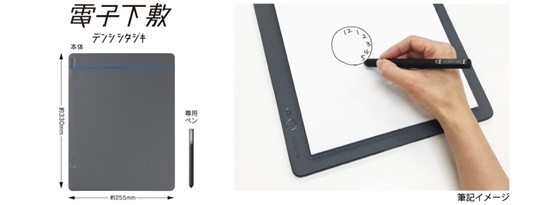Tokyo, Japan. – December 7, 2018 – Wacom Co., Ltd. announced it is cooperating with KOKUYO Co., Ltd. and the Niigata University of Health and Welfare in initial research to develop a simple and effective test for the early detection of cognitive impairment in Japan.
The joint effort will combine KOKUYO’s “Electronic Writing Pad (DENSHI-SHITAJIKI in Japanese)” and Wacom’s digital pen expertise to digitally record subjects’ handwriting strokes, creating a database in real-time and analyzing the data with newly-developed analytic software. This initiative is expected to put into practice the long-standing research by Professor Naoki Kodama at Niigata University of Health and Welfare.
In Japan, the Clock Drawing Test has been adopted as part of the driver’s license renewal procedure to determine if the applicant is displaying early symptoms of cognitive impairment. The following chart shows four applicants’ answers who have been asked to draw the clock at 10:10.

Clock Drawing Test
(Answers by four applicants asked to draw the clock at 10:10)
The above test is intended to gauge the level of applicants’ cognitive impairment by analyzing how accurately they can draw the clock on paper. The current test; however, only analyzes the completed drawing. During the test, applicants do not move the pen in one smooth motion but typically go through various thought processes such as consideration, hesitation, and revision. The whole process of drawing generates far more data than the submitted result. This joint research will obtain and analyze both the results and process of applicants’ handwriting. With the added pen movement data metrics such as pressure, direction and speed, this enables the collection of a vast amount of valuable data, which makes far more meticulous analysis possible.

KOKUYO Co., Ltd. “Electronic Writing Pad (DENSHI-SHITAJIKI)”
KOKUYO’s “Electronic Writing Pad” is an input-support tool that instantly digitizes handwriting on paper forms, so that the data can be easily processed by computers. Applicants simply go through their natural handwriting process, while researchers can acquire a large amount of data for their analyses and experiments without extra effort.
It was found that as of May 2013, there were 4.63 million patients in Japan over the age of 65 who displayed some form of cognitive impairment. Combined with the approximately four million people with mild cognitive impairment[1], this means one in four people have some form of impairment. The joint research is expected to allow for greater accuracy in early detection.
About Wacom
Founded in 1983, Wacom is a global company based in Japan with subsidiaries and affiliate offices around the world to support marketing and distribution in over 150 countries and areas. It is the world’s leading manufacturer of pen tablets, interactive pen displays and digital interface solutions. The advanced technology of Wacom’s intuitive input devices has been used to create some of the most exciting digital art, films, special effects, fashion and designs around the world and provides business and home users with their leading interface technology to express their personality. The company also offers its products as OEM solutions to leading manufacturers serving incremental markets. Wacom’s interface technology, called Wacom Feel IT technologies, is also offered as an integrated solution to strategic partners. Most tablet device and PC manufacturers count on the advanced features and reliability to deliver a superior user interface experience. For further information about the products of Wacom see www.wacom.com.
For more information, please contact:
Corporate Communication, Wacom Co., Ltd.
Tel:+81-3-5337-6702
Email: Wacom-pr@wacom.co.jp